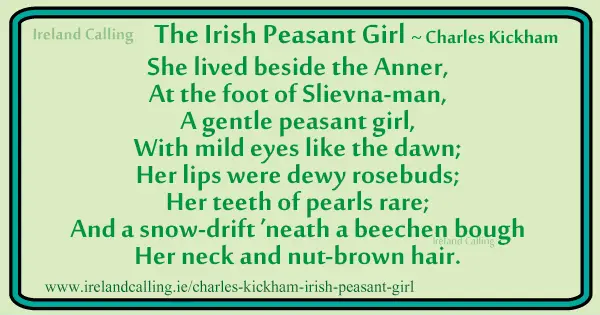Charles Kickham was an acclaimed 19th century novelist and poet. His writing reflected on the lives of the Irish peasantry – their joys, sorrows and customs.

He was a leading member of the Irish Republican Brotherhood and was imprisoned for his part in planning an Irish uprising and he wrote some of his work in prison.
The Irish Peasant Girl
She lived beside the Anner,
At the foot of Slievna-man,
A gentle peasant girl,
With mild eyes like the dawn;
Her lips were dewy rosebuds;
Her teeth of pearls rare;
And a snow-drift ’neath a beechen bough
Her neck and nut-brown hair.
How pleasant ’twas to meet her
On Sunday, when the bell
Was filling with its mellow tones
Lone wood and grassy dell
And when at eve young maidens
Strayed the river bank along,
The widow’s brown-haired daughter
Was loveliest of the throng.
O brave, brave Irish girls—
We well may call you brave!—
Sure the least of all your perils
Is the stormy ocean wave,
When you leave our quiet valleys,
And cross the Atlantic’s foam,
To hoard your hard-won earnings
For the helpless ones at home.
“Write word to my own dear mother—
Say, we’ll meet with God above;
And tell my little brothers
I send them all my love;
May the angels ever guard them,
Is their dying sister’s prayer”
And folded in a letter
Was a braid of nut-brown hair.
Ah, cold and well-nigh callous,
This weary heart has grown
For thy helpless fate, dear Ireland,
And for sorrows of my own;
Yet a tear my eye will moister,
When by Anner side I stray,
For the lily of the mountain foot
That withered far away.

